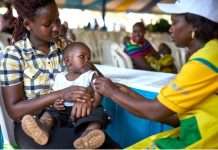A new study has shown that at least 23 million miscarriages occur every year, around the globe, although the actual result is likely to be higher due to underreporting.
Research conducted by an international team of experts found that around one in seven pregnancies end in miscarriage, and around one in a hundred women suffer three or more losses.
The assessment published in The Lancet also showed levels of care for women suffering miscarriage is highly uneven across countries, and even within many wealthy nations.

A miscarriage is widely defined as the loss of a pregnancy before 20 to 24 weeks of gestation, with the exact period varying from country to country.
Misconceptions about miscarriage were also widespread, with many women believing they occur only rarely, or that they can be caused by lifting heavy objects or previous use of contraceptives.
The experts noted such misconceptions can be damaging, leaving women and their partners feeling at fault and discouraging them from seeking treatment and support, or thinking there's no effective treatment.
They said, “A new system is needed to ensure miscarriages are better recognised and women are given the physical and mental health care they need.”
“Silence around miscarriage remains not only for women who experience it but also among healthcare providers, policymakers, and research funders,” said co-lead author Siobhan Quenby, a professor at the University of Warwick and director of Tommy’s National Centre for Miscarriage Research.
The Lancet said in a companion editorial that for too long miscarriage has been minimised and often dismissed.
Two percent of women – one in 50 – have experienced two miscarriages, while less than one percent have been through three or more.
The level of care for women suffering a miscarriage is highly uneven across countries, and even within many wealthy nations, the data showed.
“A new system is needed to ensure miscarriages are better recognised and women are given the physical and mental health care they need,” the researchers said in a statement.
They may also think that there are no effective treatments to prevent a miscarriage, especially in women at high risk.
A review of published academic literature up to mid-May 2020 identified many causes for miscarriages, including a more advanced maternal age, previous miscarriages, and a father older than 40.
Other risk factors correlating with pregnancies that end spontaneously are being extremely under or over-weight, smoking, alcohol consumption, persistent stress, working night shifts, and constant exposure to air pollution or pesticides.
Health consequences can be severe, especially for women who experience a second or multiple miscarriages.
“Recurrent miscarriage is a devastating experience for most women, but the mental health impact is rarely acknowledged or addressed in medical care,” said co-lead author Arri Coomarasamy, from the University of Birmingham.
“Women can experience trauma and bereavement, which may have no obvious sign and can go unrecognised.”
There is also a link with anxiety, depression, and — for about 20 percent of women – post-traumatic stress disorder nine months after a miscarriage.
The authors of the three studies noted that most data comes from wealthier nations, but that the “silence around miscarriage” is found everywhere.
They recommended that national health authorities strengthen miscarriage care services, improve research in prevention, and identify women at high risk.
“For too long miscarriage has been minimised and often dismissed,” The Lancet said in a companion editorial.
“The lack of medical progress should be shocking – instead, there is pervasive acceptance. The era of telling women to ‘just try again’ is over,” The Lancet said.













